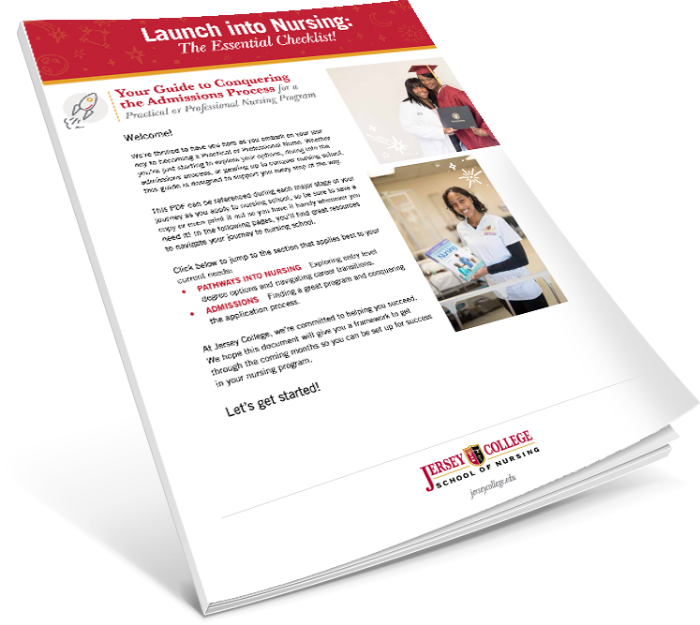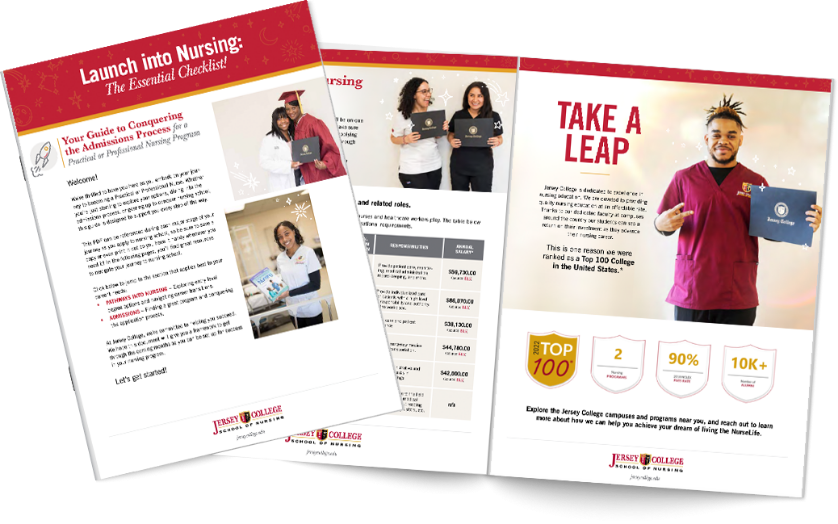
What is an LVN?
LVN vs. LPN: Is There a Difference?
Licensed practical nurses (LPNs) are essentially LVNs. The difference is limited to the title, which is determined solely by state. The terms are generally used interchangeably, as the positions’ duties and requirements are equal.
Since LVNs and LPNs have the same role and differ only by title and location, let’s consider the terms synonymous in examining the job qualifications, responsibilities, locations, compensation, and growth outlook.
Becoming an LVN is a several-step process consisting of training and certification, followed by examination and licensing. A GED or high school diploma is required to become an LVN. Next, a state-approved nursing program must be completed.
Programs for practical nurses last 1-2 years and are commonly offered through colleges including Jersey College, universities, vocational schools, community colleges, and online programs. Training programs for LVNs usually grant a diploma, degree, or certificate of completion.
The exam that vocational nurses must pass to obtain their license is called the National Council Licensure Examination (NCLEX-PN). The National Council of State Boards of Nursing requires completion of this standard in order to be eligible for vocational nursing work. The exam is designed to test the training and competency of candidates who have completed the necessary state-approved training courses.
If you’re seeking a program in practical nursing to become an LPN/LVN, Jersey College offers LPN programs at several New Jersey and Florida campuses.
Program length is subject to change and is determined based on a number of factors, including, but not limited to: (i) pace of completion, (ii) quantity of credits taken per term, (iii) repeats of coursework, and (iv) leaves.

FREE Essential Guide to Nursing School: Get Accepted, Survive, and Thrive!
Where do LVNs Work?
Licensed vocational nurses provide care for patients in a wide range of settings. Some examples include hospitals, physicians’ offices, rehabilitation centers, outpatient clinics, and nursing homes. Additional workplaces where you might find LVNs are:
- Blood banks
- Dialysis centers
- Psychiatric centers
- Extended care facilities
- Correctional facilities
Vocational nurses also work in schools and private homes, often full-time, spending long shifts on their feet. All positions for licensed vocational nurses are impactful, and some are more autonomous, like home health and nursing homes.
What Technical Skills and Knowledge are Learned in LVN Programs?
Vocational nursing is a demanding job with a wide range of duties, both physical and clerical. LVNs must have a solid foundation in nursing and medical training, as well as physical stamina, attention to detail, compassion, focus under pressure, effective communication, discretion, time management, and multi-tasking abilities.
A range of material is covered in vocational nursing school programs, from organic sciences to hands-on training, including various subjects which contribute to the myriad demands of providing quality patient care.
The required training for LVNs takes 1-2 years and varies by state. Some states offer 1-year LVN nursing programs. Others have 2-year associate degrees.
The subjects learned in a nursing program include, but aren’t limited to
- Nutrition
- Pharmacology
- Therapeutic, rehabilitative, and preventative nursing
- Legal and ethical responsibilities
- Cultural considerations for diverse patients
- Physiology
- Anatomy
Beyond the standard training courses for basic licensing standards, a variety of diverse additional certifications are available to enhance vocational nurses’ qualifications. Extra training and certification in specialty fields are required for some positions and can help LVNs with advancement.
What are the Job Responsibilities of an LVN?
Commonly employed in hospitals and other medical facilities, licensed vocational nurses report to registered nurses and physicians, assisting in nursing care and performing the following tasks:
- Provide the first point of contact and bedside care for patients
- Assess and monitor vitals, update charts, and report patient status to superiors
- Tend to patients' basic needs, like dressing, bathing, and comfort maintenance
- Organize and administer medication, change bandages, draw blood, and insert catheters
- Prep patients for surgery and treatment
- Clean and manage medical supplies
- Discuss care plans with patients and care teams

Sign up to get new articles in your inbox and stay updated on our nursing programs.
What Is the Average Salary of an LVN?
Licensed vocational nursing is a promising career path offering attractive entry-level salaries and opportunities for growth. LPNs, and vocational nurses in some states, tend to earn an average salary of nearly $50,000, with a 10% variance in each direction.
Salaries for all types of practical/vocational nurses vary by state and region, according to the cost of living and the specific type of care setting. For example, physicians’ practical nurses tend to earn less than in residential care facilities while hospital LPNs tend to earn higher salaries.
Vocational nurses who advance their education and careers to become nursing admins or registered nurses can increase their potential earnings significantly.
According to the National Bureau of Labor Statistics , licensed practical and vocational nurse salary estimates range from roughly $45,000 to about $77,000 and break down to a mean hourly wage of about $29.
With the rising statistics for chronic disease and the average American lifespan, healthcare professions are increasingly in demand. Growth is expected within the nursing field over the next decade at a rate of 6%.
Learn more in our Nursing Salary Guide.
What are the Differences Between an LVN and an RN?
Licensed vocational nurses and registered nurses frequently work alongside one another, but becoming an RN requires a higher level of education, such as an associate’s degree in nursing, although there are track options for LVN to RN training.
Because registered nurses oversee LVNs and perform more in-depth job duties, such as patient assessments and diagnostic tests, their salary is usually higher. However, both positions are vital to ongoing public health needs and play integral roles in patient care.
It’s not uncommon for those entering the field to start with practical nursing to determine whether it’s a good fit, then advance to other roles like registered nursing. For those who plan to become RNs, an LVN nursing program is a common avenue. Again, becoming a registered nurse requires more training, additional examination for licensing, and added work responsibilities.
Additional Resources
Still curious to learn more about the LVN/LPN career path? This indispensable, in-demand career lets you can make a difference and gain priceless knowledge and valuable experience through caring for others.
Learn more here:
For further information and additional resources, check out these organizations and associations for nurses:
Become a Nurse with Jersey College
Becoming a medical practitioner is no small undertaking. If you’re looking to get a nursing degree, Jersey College is here for you. Whether you’re just starting your first course or years into your journey, you’ve come to a place that can support your needs. We’re here to make sure you start your career with every advantage you can possibly get.
If you want to learn more about the Nurse Life, we’re here to help. You can speak to your campus Admissions representative – we look forward to meeting you soon!
Find Your Campus
Based on the success of our programs, we have grown to serve communities in 7 states (and counting!). Find a campus near you to start your NurseLife.

FREE Essential Guide to Nursing School: Get Accepted, Survive, and Thrive!
